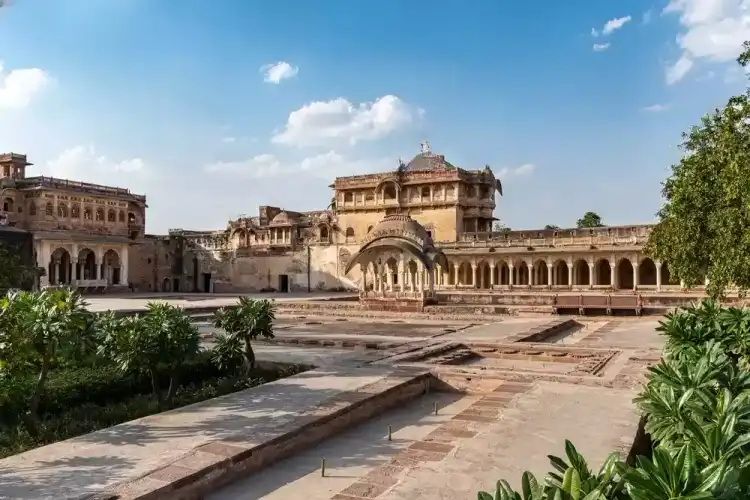Nagaur District: A Comprehensive Guide
Introduction
Nagaur district, situated in the state of Rajasthan, India, is a region rich in history, culture, and natural beauty. This article provides an in-depth look at Nagaur, covering its demography, geography, cultural heritage, cuisines, historical significance, notable poets and authors, and administrative structure.
Demography
Nagaur district has a diverse population with a mix of various communities and cultures. According to the latest census, the population of Nagaur is approximately 3.3 million. The district exhibits a balanced gender ratio and a literacy rate that is progressively increasing due to ongoing educational initiatives.
Population Distribution
The population is predominantly rural, with a significant number of inhabitants engaged in agriculture and related activities. The urban population is concentrated in Nagaur city, which serves as the district headquarters.
Geography
Nagaur is located in the heart of Rajasthan, bordered by Bikaner, Jodhpur, Pali, Ajmer, and Sikar districts. The geographical landscape is characterized by semi-arid conditions, with sparse vegetation and rolling sand dunes.
Climate
The climate of Nagaur is typical of the Thar Desert region, with hot summers, mild winters, and scanty rainfall. The temperature can soar above 45°C in summers, while winters see temperatures dipping to around 5°C.
Natural Resources
Nagaur is rich in mineral resources, particularly limestone, gypsum, and salt. The region is also known for its high-quality marble and sandstone, which are extensively mined and exported.
Cultural Heritage
Nagaur boasts a vibrant cultural heritage, influenced by its historical background and the confluence of various traditions. The district is famous for its fairs and festivals, traditional music, dance forms, and local crafts.
Fairs and Festivals
One of the most notable events is the Nagaur Cattle Fair, held annually and attracting traders and visitors from across the country. The fair showcases a wide variety of livestock, local handicrafts, and cultural performances.
Traditional Crafts
Nagaur is renowned for its handicrafts, including pottery, weaving, and embroidery. The local artisans are known for their exquisite work in leather, brass, and wood.
Cuisines
The cuisine of Nagaur is a reflection of its rich cultural tapestry and agricultural abundance. Traditional Rajasthani dishes dominate the culinary landscape, with a focus on hearty, spicy flavors.
Signature Dishes
- Dal Baati Churma: A quintessential Rajasthani dish consisting of baked wheat rolls served with lentil curry and sweetened cereal.
- Gatte ki Sabzi: A spicy curry made with gram flour dumplings.
- Laal Maas: A fiery meat curry made with red chili paste, a specialty of Rajasthan.
History
Nagaur has a storied history that dates back to ancient times. It has been a significant center of power and culture through various dynasties and empires.
Ancient and Medieval Periods
Nagaur's history is marked by the rule of the Chauhans, Delhi Sultanate, Mughals, and the Marathas. Each period left an indelible mark on the region's architecture, culture, and societal structure.
Forts and Monuments
Nagaur Fort is a prime example of the district's historical significance. Built in the 12th century, the fort has witnessed numerous battles and has been a seat of administration and power for various rulers.
Notable Poets and Authors
Nagaur has been home to several distinguished poets and authors who have contributed to Indian literature.
Amir Khusro
Amir Khusro, a legendary Sufi poet, is one of the most celebrated literary figures associated with Nagaur. His works in Persian and Hindavi have had a profound influence on the literary and cultural landscape of India.
Other Literary Figures
The district has also produced contemporary writers and poets who continue to enrich its literary heritage.
Administration
The administrative framework of Nagaur is well-structured to manage its vast and diverse geography.
District Administration
The district is divided into multiple tehsils, each headed by a Tehsildar. The District Collector oversees the administration, ensuring the implementation of government policies and development programs.
Infrastructure Development
Nagaur has seen significant improvements in infrastructure, including roads, healthcare facilities, and educational institutions. The focus on sustainable development and modernization is evident in ongoing projects aimed at enhancing the quality of life for its residents.
Suggested Diagram
Conclusion
Nagaur district is a remarkable blend of historical richness, cultural diversity, and modern development. From its significant historical monuments to its vibrant cultural festivals and traditional crafts, Nagaur offers a unique glimpse into the heart of Rajasthan. The district continues to thrive and develop, preserving its heritage while embracing progress.
